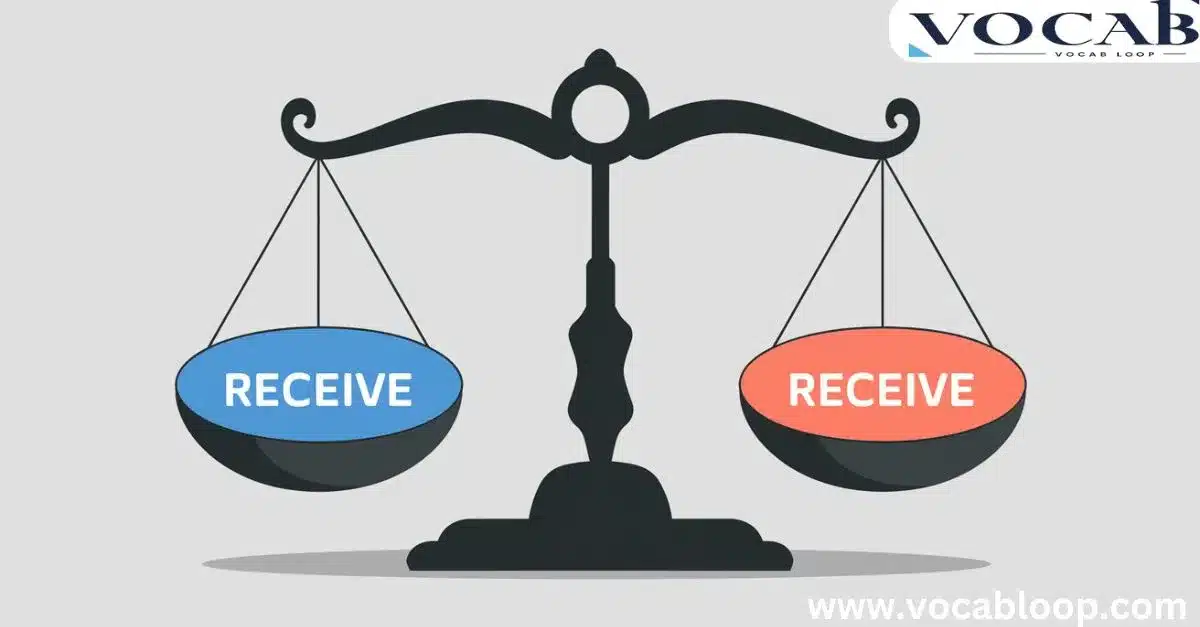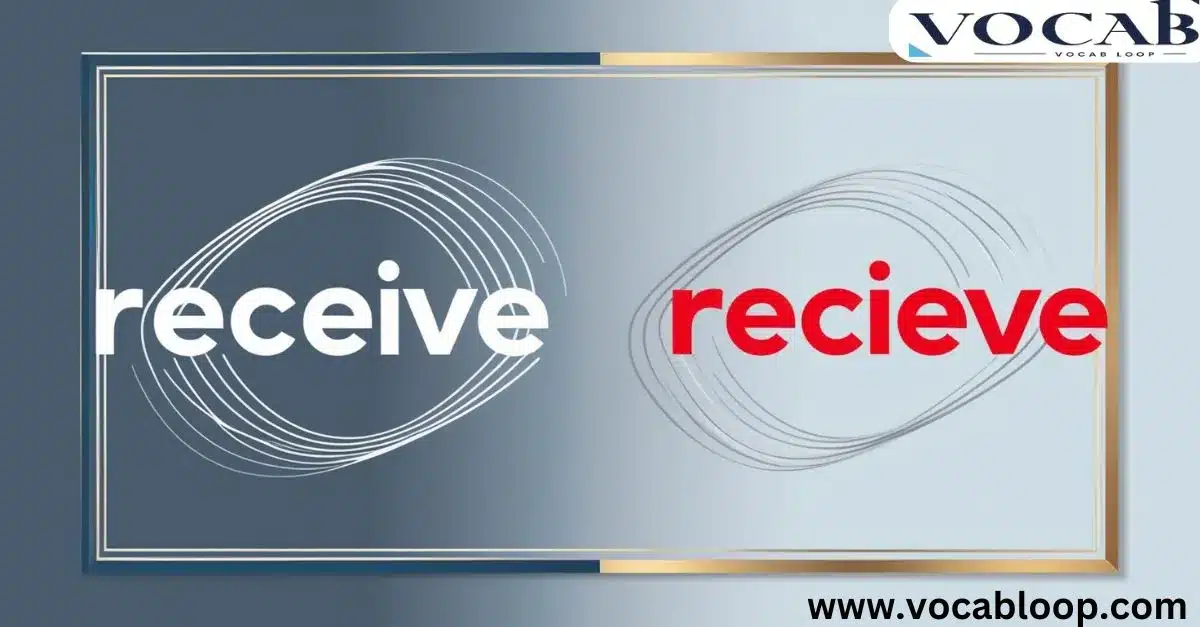In the realm of professional writing, few spelling errors appear as frequently as the “recieve” or “receive” confusion. This widespread common spelling dilemma affects writers at all levels, from beginners to seasoned professionals. The confusion often stems from English’s complex spelling rules, particularly the famous “i before e except after c” rule, which actually applies correctly in this case.
Modern digital communication has made proper spelling more crucial than ever. With the rise of professional emails, business documents, and online content, a single spelling error can impact your credibility. Understanding the distinction between these spellings demonstrates your commitment to language mastery and attention to detail.
Recieve
Is recieve a real word?
Despite its frequent appearance in informal writing and social media, “recieve” is not a legitimate word in any form of English. This incorrect spelling represents one of the most common language errors in written communication. The prevalence of this error often leads to its perpetuation, as writers may see it used incorrectly and assume it’s acceptable.
Definition
As “recieve” is an incorrect spelling, it lacks an official definition in any English dictionary.
This absence from authoritative sources confirms its status as a spelling mistake rather than an alternative spelling. Understanding this helps writers maintain professionalism in writing and avoid common pitfalls.
Meaning
The misspelling “recieve” carries no legitimate meaning in English, though it’s often intended to convey the same meaning as “receive.” This type of small error can significantly impact the perceived quality of your writing and professional communication.
Usage
There are no correct usage scenarios for “recieve” as it represents an error in language accuracy. Professional editors, teachers, and style guides unanimously mark this spelling as incorrect. In academic and professional settings, using this spelling can result in lower grades or diminished credibility.
Receive

Is receive a real word?
“Receive” stands as the universally accepted and correct spelling across all English-speaking countries. This spelling demonstrates proper attention to detail and represents the standard in both formal and informal writing. The word appears in every major English dictionary and style guide, confirming its status as the correct form for professional writing.
When examining language databases and scholarly publications, “receive” appears consistently throughout centuries of English literature. Its legitimacy is supported by etymological evidence, standardized testing, and academic institutions worldwide.
Definition
The word “receive” encompasses multiple meanings, all centered around the concept of accepting or getting something.
In its primary form, it means to take or acquire something that’s given. This definition clarification extends to both tangible and intangible items:
Primary meanings include:
- To take or acquire (something given, offered, or transmitted)
- To experience or be subjected to
- To welcome or greet formally
- To hear or accept communications
- To acquire as a result of an action or process
Meaning in Different Contexts
The versatility of “receive” showcases its importance in language understanding:
Business Context:
- Receiving payments
- Receiving goods
- Receiving business proposals
- Receiving client feedback
Academic Context:
- Receiving grades
- Receiving academic honors
- Receiving scholarly recognition
- Receiving educational materials
Social Context:
- Receiving guests
- Receiving gifts
- Receiving messages
- Receiving news
Usage
The proper usage of “receive” demonstrates confident usage across various situations:
Present Tense:
- I receive
- You receive
- He/She/It receives
- We receive
- They receive
Past Tense:
- Received (simple past)
- Have/Has received (present perfect)
- Had received (past perfect)
Future Tense:
- Will receive
- Going to receive
Pronunciation of Recieve and Receive
The pronunciation remains consistent regardless of spelling: /rɪˈsiːv/ (ri-SEEV). This consistency often contributes to the spelling confusion. Key pronunciation aspects include:
Syllable Breakdown:
- First syllable: ri (as in “rid”)
- Second syllable: ceive (as in “siege”)
Stress Pattern:
- Primary stress on the second syllable
- Weak stress on the first syllable
Regional Variations:
- American English: /rəˈsiv/
- British English: /rɪˈsiːv/
- Australian English: /rəˈsiːv/
Side-by-Side Comparison
Comprehensive analysis showing key differences:
| Aspect | Receive (Correct) | Recieve (Incorrect) |
| Dictionary Status | Standard entry | Not listed |
| Etymology | Latin “recipere” | None |
| Academic Acceptance | Fully accepted | Marked as error |
| Professional Usage | Required | Unacceptable |
| Spell Check | Passes | Flagged as error |
| Global Recognition | Universal | Error in all regions |
| Historical Usage | Documented since 13th century | Common mistake |
| Style Guide Approval | Approved | Rejected |
Which one is more acceptable

In terms of professionalism in writing, “receive” is the only acceptable form. This standard applies across:
Educational Institutions:
- Universities
- Schools
- Training centers
- Academic publications
Professional Settings:
- Business communications
- Legal documents
- Medical records
- Technical documentation
Digital Platforms:
- Professional emails
- Business websites
- Social media content
- Digital marketing materials
When to use receive or receives?

The difference between “receive” and “receives” lies in verb conjugation, specifically their use with different subjects in the present tense. Understanding these rules ensures accurate usage and helps avoid common grammatical errors:
- Use “receive” for plural subjects or singular subjects other than third-person:
- Examples:
- “I receive your emails daily.”
- “You receive updates on time.”
- “We receive feedback from clients regularly.”
- “They receive notifications immediately.”
- Examples:
- Use “receives” for third-person singular subjects (he, she, it, or any singular noun):
- Examples:
- “He receives praise for his hard work.”
- “She receives packages from overseas.”
- “It receives maintenance twice a month.”
- “The company receives numerous applications daily.”
- Examples:
Other Tenses
- Past tense: received (applies to all subjects)
- “She received a letter yesterday.”
- “They received excellent service.”
- Future tense: will receive or is going to receive (applies to all subjects)
- “We will receive the results tomorrow.”
- “He is going to receive an award for his achievements.”
Recieve or receive in US and UK English?
Both American and British English exclusively use “receive.” This consistency across English variants demonstrates strong language mastery. The spelling remains unchanged in:
In American publications, respected sources like The New York Times, The Chicago Manual of Style, and Webster’s Dictionary consistently enforce the correct usage of “receive.”
In British publications, prominent references like The Oxford English Dictionary, The Guardian Style Guide, and Cambridge English Guide also adhere strictly to the standardized spelling.
Everyday Usage Examples

Recieve – (Common Mistakes to Avoid)
- “I hope to recieve your response soon.” (Incorrect)
- “Did you recieve my email?” (Incorrect)
- “We will recieve the shipment tomorrow.” (Incorrect)
- “She expects to recieve good news.” (Incorrect)
- “The company recieves many applications.” (Incorrect)
- “Students recieve their grades next week.” (Incorrect)
- “He recieves regular updates.” (Incorrect)
- “They recieved the package yesterday.” (Incorrect)
- “I haven’t recieved any confirmation.” (Incorrect)
- “The office recieves visitors daily.” (Incorrect)
Receive – Correct Sentences
- “I was delighted to receive your invitation.”
- “The hospital receives emergency cases 24/7.”
- “Students will receive their diplomas next month.”
- “She receives compliments for her work regularly.”
- “Our office receives hundreds of applications weekly.”
- “The charity receives donations from around the world.”
- “Did you receive the meeting notification?”
- “We expect to receive the test results tomorrow.”
- “The winners receive their awards annually.”
- “He receives special training for the new position.”
Synonyms
Receive:
- Accept (to take what is offered)
- Obtain (to come into possession)
- Acquire (to come to have)
- Collect (to gather)
- Welcome (to greet)
- Get (to come into possession)
- Procure (to obtain through effort)
- Embrace (to accept willingly)
- Inherit (to receive from predecessor)
- Secure (to acquire with certainty)
Origins
Receive:
The word “receive” originates from the Latin verb recipere, which combines re-, meaning “back” or “again,” and capere, meaning “to take” or “to seize.” This root conveys the idea of taking something back or accepting it. The term passed into Old French as receivre, reflecting its widespread use in medieval European languages influenced by Latin.
Following the Norman Conquest of England in 1066, receivre entered Middle English as receiven or receve. Over time, the spelling and pronunciation were standardized into Modern English as “receive,” retaining its French-influenced orthography, particularly the “ei” combination, which aligns with the English rule “i before e except after c.”
FAQs
Why do people commonly misspell “receive”?
The “i before e except after c” rule causes confusion because many don’t realize this is one of the cases where it applies correctly.
What’s the easiest way to remember the correct spelling?
Remember: “After C, use EI to receive what you perceive.”
Does spell-check always catch the “recieve” error?
Most modern spell-checkers identify this error, but it’s important to develop confident usage without relying on technology.
Are there any exceptions where “recieve” might be correct?
No, “receive” is the only correct spelling in all English variants and contexts.
How can I improve my spelling accuracy?
Practice regular writing, use memory aids, and maintain attention to detail in all written communication.
Conclusion
As we wrap up our comprehensive exploration of the “receive” or “recieve” spelling dilemma, remember that attention to such details marks the difference between good and exceptional writing. The journey to mastering English spelling involves understanding not just rules but also their practical applications in daily communication.
By consistently using the correct spelling “receive,” you demonstrate both language accuracy and professional writing skills. Keep practicing, stay attentive to detail, and let your improved writing clarity speak for your expertise.

Alex Hormozi is a seasoned blogger at Vocab Loop, known for his deep insights into language, vocabulary, and grammar. With years of experience in writing, Alex shares practical tips and effective strategies to help readers improve their linguistic skills and enhance their writing abilities.

